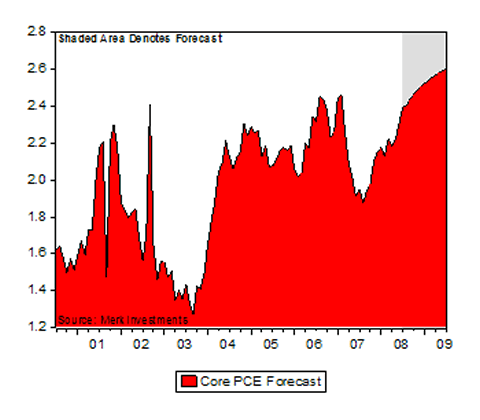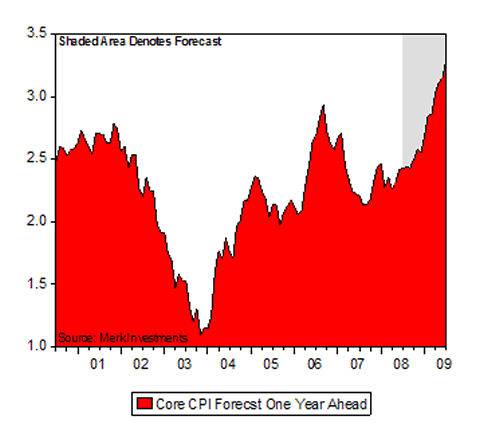Rising Inflation Ensures Stock Markets Headed for More Distress
Economics / Inflation Aug 08, 2008 - 12:33 PM GMTBy: Joseph_Brusuelas

 The enthusiastic response of the market to the moderation in the price of imported oil and the Fed monetary statement is a bit overdone. It is based on the hope that inflation will moderate rather than a hard-nosed look at the pricing environment. Our Senior Economic advisor Bill Poole, who knows more than a bit about crafting a coherent Fed statement, reminded the market recently that since August 2006 the FOMC in one way or another has been signaling that they anticipate inflation will moderate in coming quarters. Yet, our core inflation forecast suggests otherwise.
The enthusiastic response of the market to the moderation in the price of imported oil and the Fed monetary statement is a bit overdone. It is based on the hope that inflation will moderate rather than a hard-nosed look at the pricing environment. Our Senior Economic advisor Bill Poole, who knows more than a bit about crafting a coherent Fed statement, reminded the market recently that since August 2006 the FOMC in one way or another has been signaling that they anticipate inflation will moderate in coming quarters. Yet, our core inflation forecast suggests otherwise.
Our forecast implies that the June consumer price index will show continued upward movement in both the core and the headline. On a month over month basis the headline should advance 0.5% and the year over year estimate should increase to 5.2%. Using the Fed's preferred core measures provides a similar result. The core CPI should increase 0.2 m/m and 2.4% (2.481825) y/y with a real risk of a 2.5% posting, while the core personal consumption expenditure deflator should advance 0.2% and 2.4% (2.395607) over that same period.

More unsettling is our dynamic one-year ahead forecast. Looking at the CPI the core should surge out well above 3.0% by the middle of next year and the core PCE should advance to 2.6%. While some in the market may claim that inflation roughly one half of one percent above the relative comfort zones is an acceptable price to pay for stabilizing the financial system and avoiding a deeper recession, we think that this may be discounting the upside risk to these forecasts.

Headline inflation over the next months may see some easing, if the price of oil continues to fall. That is a very big “if.” However, as implied by our forecast that things may not be so quiescent inside the twin core measures. First, the liquidity that the Fed has injected into the system over the past year has not yet had its maximum impact. Monetary policy acts with long and variable lags. Once those 325 basis points of liquidity takes hold firms that have watched their once potent profit margins collapse to razor thin levels will attempt to regain some measure of pricing power. Thus the risk for core pricing in 2009 is to the upside. Sound monetary policy should always be constructed to prevent a breakout in pricing. But due to the current systemic issues in the financial system, the Fed cannot act in the timely manner that it would prefer.
Second, the economic landscape is littered with the debris of mal-investment in the housing, autos and airline industries. The inventories in housing alone will take the next few years to burn off. The supply of fuel inefficient vehicles dwarfs the sagging demand left in the consumer sector. Airlines now fly fewer miles, make fewer seats available and charge a higher price for their diminished product. Thus, the problem that economy faces is one of supply, not demand.
Once one factors in the increase in the cost of energy into the equation, what one observes is a supply shock that has forced the aggregate supply curve up and to the left. This plainly suggests that situation faced by consumers is one of higher prices and reduced supply. The accommodative policy that the Fed is currently following to stimulate demand in the aforementioned sectors will directly lead to inflationary pressures in the non-financial corporate, ex-transportation sectors. This is what is behind the debasing of the dollar and in our humble opinion not the basis for sound money.
By Joseph Brusuelas
Chief Economist, VP Global Strategy of the Merk Hard Currency Fund
Bridging academic rigor and communications, Joe Brusuelas provides the Merk team with significant experience in advanced research and analysis of macro-economic factors, as well as in identifying how economic trends impact investors. As Chief Economist and Global Strategist, he is responsible for heading Merk research and analysis and communicating the Merk Perspective to the markets.
Mr. Brusuelas holds an M.A and a B.A. in Political Science from San Diego State and is a PhD candidate at the University of Southern California, Los Angeles.
Before joining Merk, Mr. Brusuelas was the chief US Economist at IDEAglobal in New York. Before that he spent 8 years in academia as a researcher and lecturer covering themes spanning macro- and microeconomics, money, banking and financial markets. In addition, he has worked at Citibank/Salomon Smith Barney, First Fidelity Bank and Great Western Investment Management.
© 2008 Merk Investments® LLC
The Merk Hard Currency Fund is managed by Merk Investments, an investment advisory firm that invests with discipline and long-term focus while adapting to changing environments. Axel Merk, president of Merk Investments, makes all investment decisions for the Merk Hard Currency Fund. Mr. Merk founded Merk Investments AG in Switzerland in 1994; in 2001, he relocated the business to the US where all investment advisory activities are conducted by Merk Investments LLC, a SEC-registered investment adviser.
Merk Investments has since pursued a macro-economic approach to investing, with substantial gold and hard currency exposure.
Merk Investments is making the Merk Hard Currency Fund available to retail investors to allow them to diversify their portfolios and, through the fund, invest in a basket of hard currencies.
Joseph Brusuelas Archive |
© 2005-2022 http://www.MarketOracle.co.uk - The Market Oracle is a FREE Daily Financial Markets Analysis & Forecasting online publication.


